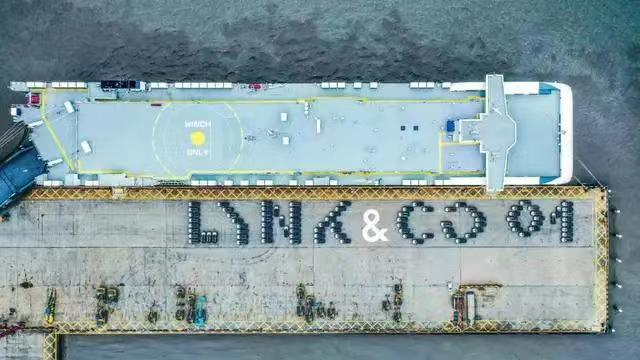According to the data from China Association of Automobile Manufacturers, the export volume of automotive enterprises has reached 1.817 million in the first eight months of this year. Among them, the export volume of new energy vehicles reached 340,000, an increase of 97.4% compared with the same period last year, which has become the core growth point of automobile export. Europe, the second-largest market for new energy vehicles in the world, has become the first choice for many domestic auto companies to go global.
At the end of October, on the occasion of the 6th anniversary of Lynk & Co’s birth, Wei Silan, the current Senior Vice President of Geely Automobile Group and CEO of Lynk & Co International (Europe), finally returned to China after a long absence, and had a more than two-hour conversation on Lynk & Co’s “going abroad” experience in recent years, especially the series of European strategies he planned and led.
Before joining Geely as Vice President of Global Marketing for the CMA product family in 2015, Wei Silan had been immersed in the traditional automotive industry for more than 30 years and had been nominated by Forbes Magazine as one of the top ten most influential CMOs in the world.
When he was young, Wei Silan spent 17 years at Ford, and then worked for 8 years at the headquarters of Luesselsham, Germany of General Motors, serving as CMO of Opel and Vauxhall, two ancient European car brands, followed by 7 years at Volvo as Senior Vice President, responsible for marketing, sales and customer service, where he not only witnessed the cooperation between Volvo and Geely, but also participated in and established the entire CMA architecture.
“When I moved from Ford to General Motors, these two American brands had almost no difference except for the logos. When I arrived at Volvo, I felt a big difference, such as the scale of the company and the Swedish culture. However, compared with Geely, this difference is even more pronounced and obvious.”
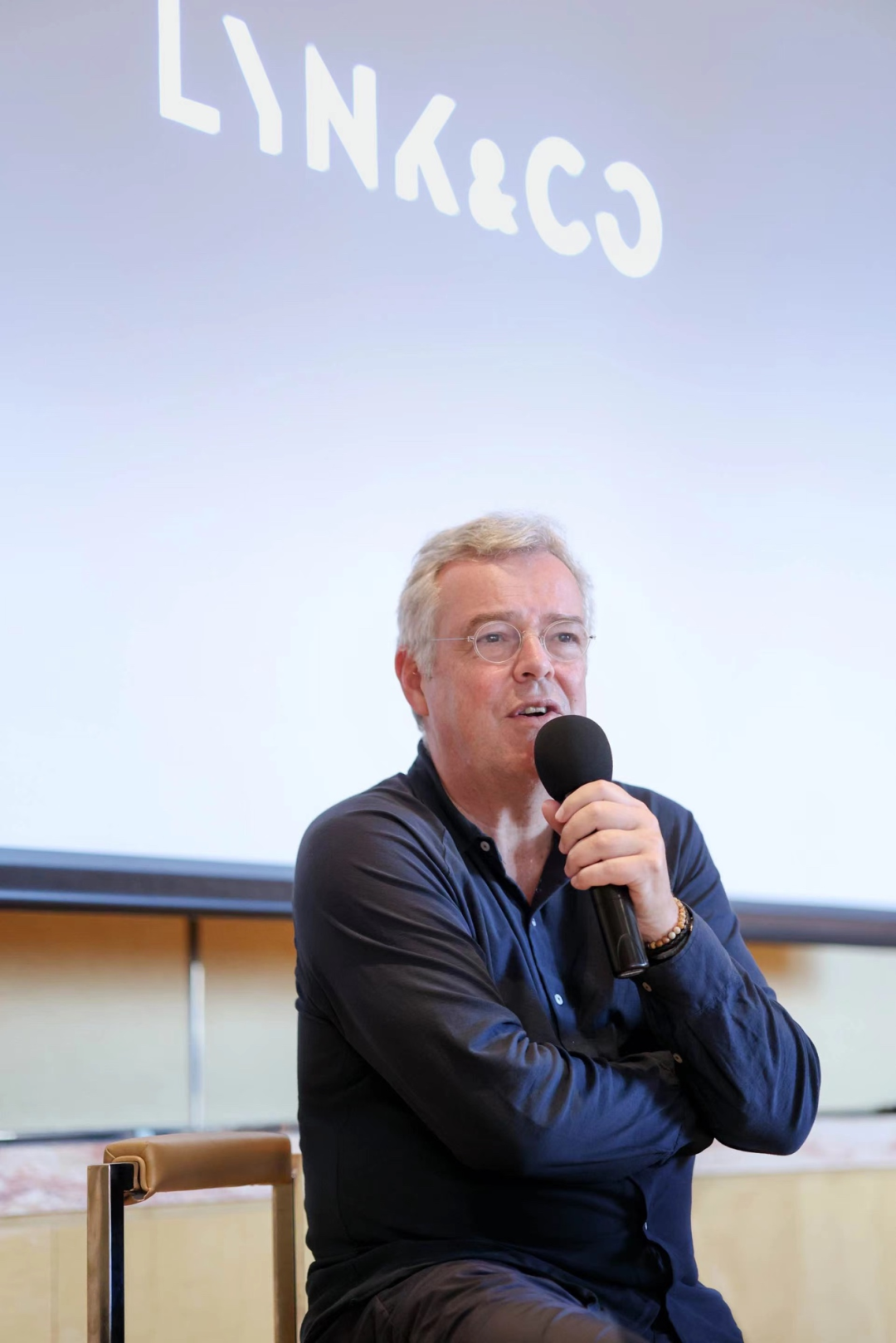 Wei Si-lan bluntly stated that the change in the traditional automotive industry over 50 years is barely equivalent to that of the artisan industry over 10 years.
Wei Si-lan bluntly stated that the change in the traditional automotive industry over 50 years is barely equivalent to that of the artisan industry over 10 years.
More importantly, his aversion to the traditional automotive industry in marketing, sales, and customer service is deep-rooted – “such a data exists, 30% of Americans would rather go to the dentist than to a car dealership!”
Car owners fear the latter more than dentists because there are more unknowns, more exciting than opening a blind box, it’s simply “fooled every time, every time different”.
As the saying goes, having witnessed others being rained on N times and seeing peers’ umbrellas fail N times, one knows that umbrellas are not reliable, but a small house roof is better.
During the start-up phase of Lynk & Co., Wei Si-lan has begun to think about how to build Lynk & Co.’s “small house roof”.
Wei Si-lan’s personality is somewhat similar to the famous Belgian compatriot Hercule Poirot: confident and direct, with clear likes and dislikes. He has many friends and many enemies. More importantly, he is extremely good at conducting large-scale investigations in the early stages, determining the direction, and delving deep until he finds the ultimate answer he desires.
For example, in 2015, he would spend one to two weeks alternating between Europe and China each month, just to observe the differences and similarities in the lifestyle and consumption habits of young people in Europe and China. He even came up with some interesting results:
Chinese young people can quickly accept and warmly welcome new internet lifestyle consumption habits such as DiDi, Uber, and shared bikes, but their thinking still leans toward tradition when it comes to large-item consumption such as housing and cars – after all, the history of car ownership in China is significantly shorter than that of Europe and the United States. Even after 2000, although China’s automobile market production and sales volumes have clearly outperformed the global market, the vast majority of people consider concepts such as “subscription” and “sharing private cars” to be not only too advanced, but also offensive.They cannot accept spending several thousand yuan on a monthly “subscription” to own a car, and they are even less willing to share their own cars with strangers, as it lacks a sense of belonging and security. They prefer to spend tens or even hundreds of thousands of yuan to fully own a car, even if it means encountering parking difficulties and expensive refueling, even if 96% of the car’s life is stagnant and abandoned.
In contrast, young people in Europe have a more radical concept of car ownership, with at least 20% of them looking for services beyond the vehicle itself. Power is no longer a top priority, and WiFi is.
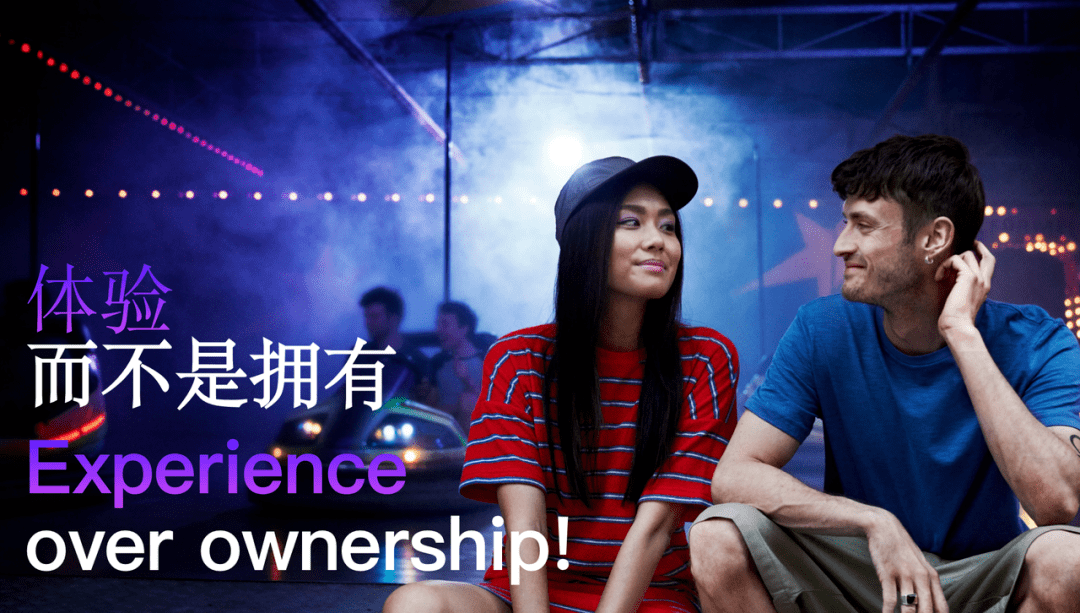
There are also many people who question whether converting their gasoline-fueled cars to new energy vehicles can reduce carbon emissions and alleviate global warming. Some more radical young people believe that truly environmentally friendly and avant-garde living is to completely abandon the traditional concept of car ownership: no longer spending huge sums of money to buy cars, but making full use of currently vacant cars to reduce their stagnation time and increase their actual operating time.
This is why Wei Silan decided to abandon the traditional marketing, sales, and service routes of traditional car companies in Europe and fully embrace the new trend: mobile internet and sharing economy. Although the old road was still wide and easy to walk on, it led directly to Rome.
The English name of LYNK & CO is now derived from mobile internet and sharing economy.
In Europe today, LYNK & CO’s marketing, sales, and customer service practices are considered the most radical in the entire industry.
For example, the brand only offers a single model in two colors, the LYNK & CO 01 plug-in hybrid.This is not only because there have always been problems in the European supply chain, which forces Lynk & Co to stay small and beautiful, but also because Wei Sislann believes that the car they have in the European market is already sufficient. He is extremely familiar with the local people’s driving habits and car preferences, not only because this car can meet 70% of their travel needs, but also because the locals have long been accustomed to using small cars for travel.
To some extent, young Europeans still follow certain traditions in their car choices. After all, Europe’s industrial and urbanization processes began earlier, and ancient towns and small roads are more suitable for small cars.
In addition to the simplified car models, Wei Sislann’s sales and customer service are also very different from traditional car manufacturers or travel service companies.
Lynk & Co adopts a comprehensive service model of “subscription + sharing + offline experience store”.
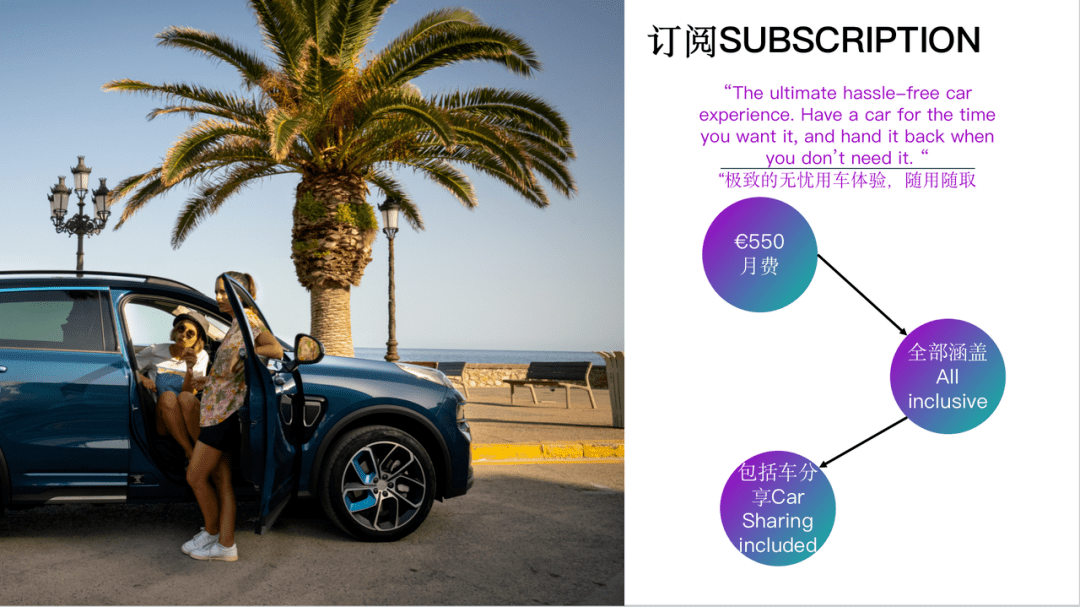
The so-called car subscription model is actually the same as the APP subscription model in smartphones — you can pay continuously by month or even only subscribe for one month. This business model has actually existed since the Lynk & Co brand was launched in Europe in 2016 and officially landed with the European strategy in September 2020.
“There are differences between subscriptions and subscriptions. In 2016, when Lynk & Co first launched the subscription model to the market, other car manufacturers also followed suit and launched a mode called subscription. Actually, their subscriptions should be called short-term rentals, with minimum lease terms. There is no other company that can offer “monthly subscriptions” like we do, which can be stopped or canceled at any time. They look like some kind of marketing gimmick, rather than a genuine subscription service,” explained Wei Sislann.The subscription fee for Lynk & Co is currently €550 per month, which is equivalent to about RMB 4000 for Chinese consumers. While it may seem extravagant to spend RMB 4000 per month to rent a car, the truth is that transportation costs for mobility in Europe and America are already quite high.
“Probably around 500 euros per month for taking Uber and public transportation. And the majority of people who pay these costs are young people who can’t afford to buy a car. We’ve given them a new option, where they can spend the same amount of money and have the right to use, rent, and sublease a car. This is very attractive,” said a spokesperson for Lynk & Co.
In addition to the subscription model, Lynk & Co has a more comprehensive membership system. With these two options combined, European consumers have four highly flexible ways to own a car: monthly subscription membership, free membership, B2B, and direct purchase.
Yes, Lynk & Co also has a large number of free members in Europe.
The reason they can become members is that their car ownership is highly specialized – by temporarily renting some idle vehicles through “car sharing”. In Europe, many monthly subscription members and real car owners already use “car sharing” to increase the utilization rate of idle vehicles.
Free members simply need to search for all available Lynk & Co vehicles in their area on the mobile app and then select a vehicle based on distance and pricing. Once selected, they will receive a corresponding password, which they can use to access the vehicle during the designated time period set by the original owner.
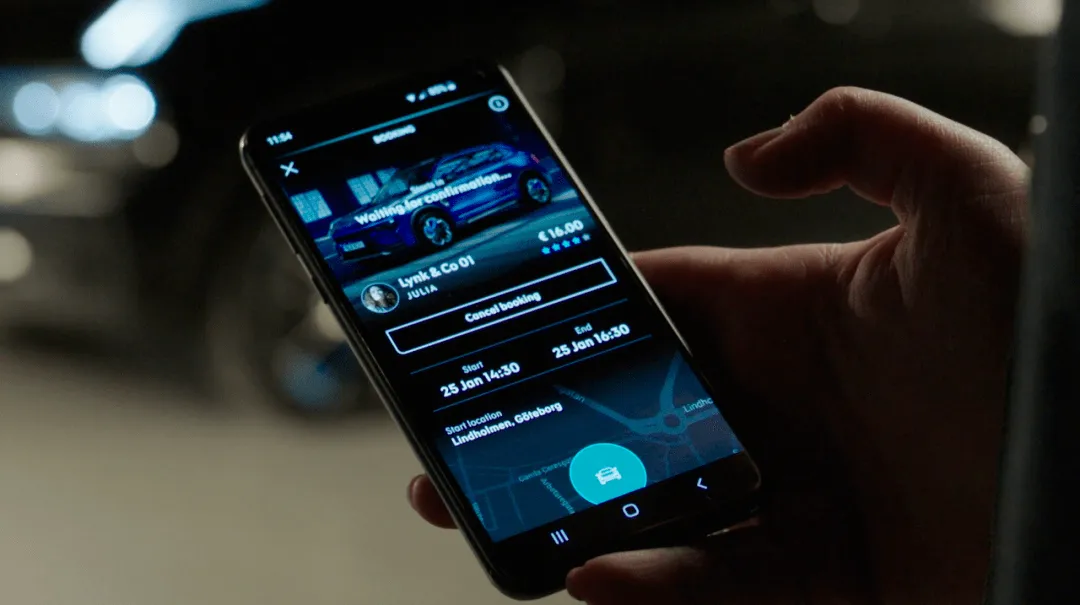 For many monthly subscription members, the “enticing” additional feature is very attractive, and many people will open this feature to share the cost. Because the more times you share, the lower the subscription cost. Even some subscription members can earn more than 900 euros a month through car sharing! Deducting the 550 euros monthly rent, you can still earn 350 euros net profit, achieving perfect profitability through the sharing model.
For many monthly subscription members, the “enticing” additional feature is very attractive, and many people will open this feature to share the cost. Because the more times you share, the lower the subscription cost. Even some subscription members can earn more than 900 euros a month through car sharing! Deducting the 550 euros monthly rent, you can still earn 350 euros net profit, achieving perfect profitability through the sharing model.
The effect of Lynk & Co’s series of moves is evident. Since 2016, Lynk & Co has delivered 28,000 new cars in Europe, 20% of which have been used for sharing, and there are 150,000 subscription members. For a new force brand with only one model, it is undoubtedly very successful.
Finally, the offline experience store section in the full-service mode is called the “club” in Europe.
In November, Lynk & Co’s tenth experience store in Europe will be opened in Milan. One year ago, Lynk & Co’s fourth offline experience store in Berlin, Germany, became popular in the local area.
Because this offline experience store can be called the most unique car brand offline experience store in Berlin—located in the city center, the entire store only has one car, and there are many non-brand-related small commodities for sale in the store. At the corner of the first and second floors of the store, there are also Berlin’s iconic traffic lights made into decorations.
Not only that, these experience stores will become a real club every two evenings a week, providing various elements such as cocktails, music, and DJs. It is not only for members, but anyone who wants to come can participate.
Such a special offline store is a routine operation for Lynk & Co.
Because Lynk & Co generally places a sample car in a prominent position at each experience store—even the offline experience store in Rome, Italy, has no car inside.Each Lynk & Co clubhouse offers special nighttime activities and a variety of goods for sale that are unrelated to the Lynk & Co brand, but coincidentally align with some of Lynk & Co’s perspectives. These goods often originate from local brands, including many products crafted from small workshops. However, they all share one thing in common: an interesting and sustainable story. For example, there is a particular pen sold at one clubhouse that is made from metal confiscated from firearms.
Of course, each Lynk & Co offline clubhouse has its unique features, such as elements related to Lynk & Co, different displays and methods, and varying locations in cities, streets, communities, and lifestyles.
Joel Winckler, Chief Creative Designer (Europe) at Lynk & Co, described these clubhouses as a “tribute to the city” and “visiting a store is like visiting a city” full of coincidences, freshness, and surprises.
Asked about Lynk & Co’s biggest challenge in Europe, Patrik Widerstrand, Head of Design at Lynk & Co, claims that this challenge is an attitude of arrogance and resistance that can be constantly felt locally, which Japanese car manufacturers faced 50 years ago and Korean car manufacturers faced 20 years ago. They always believe that their cars, technology, and brands are better than those of other countries and markets. However, he believes that the day of the Chinese companies’ breakthrough is approaching because of their strong technical capabilities, constantly improving and optimizing designs, and outstanding user experiences. The Belgian emphasizes, “If Lynk & Co were just a new car company, it would only be one of hundreds of car companies in the world, and the world no longer needs new car companies. What people need now is a better mobility service company that emphasizes unique experiences and emotionally compelling brand stories that leave traditional automotive companies unable to catch up.”According to its planning in Europe over the years, Volvo’s all-round service concept is indeed more profitable and stable than just selling cars. This is a typical long-term thinking, and the operating cost is currently one-third of most traditional automakers – such as some Volvo 01 models specially designed for subscription programs, when their residual value approaches the cost of the vehicle, Volvo will take these cars back and resell them as second-hand cars.
This means that the total revenue of this car includes the monthly subscription fee, the sharing and renting fee, and the revenue from selling the car as a second hand, which is far more profitable than the profit margin of traditional direct sales.
He used an interesting analogy: “Traditional automakers are like Boeing, while service brands like Volvo are more similar to Lufthansa. Do most European consumers consider the airline company or the aircraft brand first when traveling long distances?”
This article is a translation by ChatGPT of a Chinese report from 42HOW. If you have any questions about it, please email bd@42how.com.
